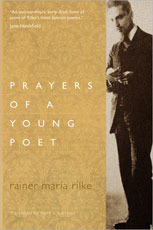Rainer Maria Rilke (1875-1926) is known for his evocative, mysterious, and paradoxical poetry. He believed in the power of this art form to be a creative and transformative force. There are spiritual messages tucked away in many of his poems.
Mark S. Burrows has translated the poems in Prayers of a Young Poet and written an eloquent introduction to this deeply spiritual work which was written in 1899. Burrows sees these poems as tailor-made for seekers on a spiritual path. Rilke's longing for a sense of the divine presence in the midst of life mirrors the feelings and hopes of many contemporary men and women.
These poems, observes Burrows, arise out of solitude and wander into a waiting silence. Rilke salutes the "becoming" of God who is still evolving, using a variety of words to address the Holy One including "the ancient tower," "the dawning one," "the song we sang in every silence," and "a great homesickness."
One of the best things about Prayers of a Young Poet is that Rilke's poems leave the reader plenty of room to measure their faith in comparison with his. This will appeal to the social media crowd who are used to expressing themselves as much as they can.
